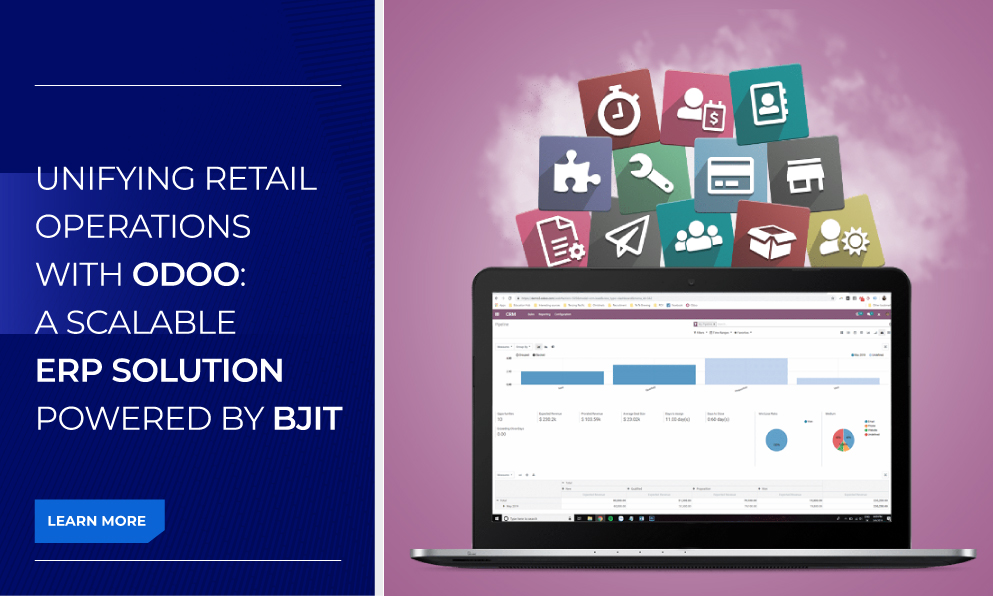Description
Choosing the right Odoo implementation partner in 2025 can make or break your ERP success. This definitive checklist blog explores essential evaluation criteria, red flags, and how top-tier partners like BJIT align with your ERP goals.
Introduction
In today’s fast-paced digital economy, businesses must embrace advanced ERP solutions to stay competitive and agile. Among the top ERP systems, Odoo stands out due to its modular architecture, cost-effectiveness, and ability to adapt to a wide range of industries. Whether it's automating inventory processes or streamlining customer relationship management, Odoo offers a unified platform for seamless business operations.
However, the success of an Odoo implementation is not determined by the software alone. A successful ERP rollout heavily depends on selecting the right implementation partner — a team that not only understands Odoo's technical architecture but also has a deep appreciation for your industry, business model, and long-term goals. In 2025, this decision is even more critical due to increasing system complexities, remote collaboration requirements, and the growing importance of integration with AI, IoT, and cloud-based tools.
A poor implementation can lead to significant losses: delayed go-lives, inflated budgets, low user adoption, and misaligned configurations. Conversely, the right partner ensures your business reaps the full benefits of Odoo: improved efficiency, real-time visibility, and scalable growth. This blog presents a detailed checklist to help you evaluate potential Odoo implementation partners thoroughly and make a confident, future-ready choice.
Why the Right Odoo Partner Matters
ERP implementations are notoriously complex and fraught with challenges. According to Panorama Consulting Group (2023), more than 50% of ERP projects fail to achieve their expected benefits, and over 60% exceed initial budget expectations. These failures are rarely due to the ERP system itself but rather the implementation strategy and partner misalignment (Panorama Consulting Group, 2023).
Choosing the right Odoo partner has several critical advantages:
- Tailored solutions: Partners with domain experience can map Odoo modules to your exact business processes.
- Efficient configuration: Experienced teams can avoid unnecessary modules and optimize workflows.
- Customization expertise: Properly scoped and coded customizations help you extend Odoo’s core capabilities without breaking upgrades.
- User training & support: Ongoing assistance and change management ensure employees embrace the new system.
- Risk mitigation: Partners who apply structured methodologies can identify potential bottlenecks and solve issues proactively.
In 2025, the stakes are higher than ever. Businesses now require ERP systems that are not just functional, but also intelligent, responsive, and integrated with broader IT ecosystems. Your Odoo partner needs to be a strategic collaborator, not just a vendor.
The Ultimate 2025 Odoo Partner Evaluation Checklist
1. Business Alignment & Domain Understanding
Key Question: Do they understand your business model and industry challenges?
Every industry has unique needs. For example, a manufacturing firm might prioritize supply chain traceability, while a service company might focus on time tracking and invoicing automation. A partner with domain knowledge can recommend the right Odoo apps, customize them appropriately, and even challenge your assumptions for better solutions.
A good partner conducts discovery workshops, stakeholder interviews, and process audits before proposing any solution. BJIT excels in aligning Odoo solutions with the business objectives of clients across manufacturing, healthcare, logistics, retail, and more, offering strategic insights rather than generic services.
2. Proven Experience and Case Studies
Key Question: Can they demonstrate a history of successful Odoo implementations?
Don't just rely on their marketing materials. Ask for:
- Industry-specific case studies
- Measurable KPIs from previous projects
- References from past clients
Check if the partner has worked with businesses of your size and complexity. For instance, BJIT’s portfolio includes successful global implementations in Japan, the USA, the EU, and South Asia, supporting clients from startups to enterprises.
3. Odoo Certification & Partnership Tier
Key Question: Are they an officially recognized Odoo partner?
Official partners are more accountable, better trained, and stay updated with the latest Odoo releases. Odoo grants Gold, Silver, or Ready status based on:
- Client satisfaction
- Developer certification
- Implementation success rate
Choosing a certified partner like BJIT (an Odoo Silver Partner) provides peace of mind and higher success probability.
4. Technical Expertise & Customization Capability
Key Question: Can they handle complex customizations and integrations?
Odoo offers out-of-the-box functionality, but real business needs often require custom development. Ensure your partner can:
- Customize existing modules without affecting core stability
- Build new modules
- Perform data migrations
- Integrate with third-party tools (e.g., Salesforce, Shopify, QuickBooks)
BJIT’s customization services include everything from UI enhancements to complex API-based integrations, ensuring that your ERP solution evolves with your business.
5. Strong Project Management Skills
Key Question: Do they follow a structured project methodology?
A robust project methodology avoids scope creep, ensures timely delivery, and maintains quality. Indicators of strong project management include:
- Agile or hybrid implementation models
- Dedicated project managers
- Weekly status reports
- Risk tracking and escalation protocols
BJIT leverages Agile frameworks, ensuring adaptive planning, early delivery, and continuous improvement through transparent stakeholder engagement.
6. Transparent Pricing & Contractual Clarity
Key Question: Do they offer clear, upfront pricing and deliverables?
ERP implementations often suffer from cost overruns due to vague estimates. A professional partner:
- Shares detailed project scope and milestones
- Offers fixed-price options or time-and-materials clarity
- Defines costs for customization, testing, training, and support
BJIT’s pricing models accommodate various business needs, offering budget-friendly and scalable options with no hidden charges.
7. Training & Post-Go-Live Support
Key Question: Will they train your team and offer ongoing support?
No ERP system succeeds without proper user adoption. Check if your partner offers:
- Role-based training
- Comprehensive documentation
- On-demand troubleshooting
- Multi-channel support (email, phone, ticketing systems)
BJIT ensures complete knowledge transfer through tailored training sessions and provides 24/7 support services suited for global time zones.
8. Localization and Regulatory Compliance
Key Question: Do they support legal and accounting compliance for your region?
Whether it's U.S. sales tax, European VAT, or Japanese accounting practices, your Odoo system must comply with local regulations. A qualified partner will:
- Implement tax engines like Avalara or TaxCloud
- Set up correct chart of accounts and journals
- Enable multi-language, multi-currency, and GDPR compliance
BJIT has successfully implemented compliant systems for clients across North America, Europe, and Asia, adapting to each region's legal landscape.
9. Client References & Reviews
Key Question: Can they connect you with past clients?
Speak directly with existing or past clients to:
- Confirm claims made during pitches
- Understand communication styles and cultural fit
- Assess how they handle challenges
BJIT encourages reference checks and showcases a wide range of client testimonials and case studies, reinforcing its transparency and accountability.
10. Innovation and Future-Readiness
Key Question: Are they incorporating modern technologies and trends?
Today’s ERP must support digital transformation. Choose partners who invest in:
- AI and machine learning for predictive analytics
- Mobile ERP solutions for field agents
- IoT integrations for smart factories
BJIT offers AI-infused ERP features like smart reporting, automated alerts, and intelligent demand forecasting, making your system smarter with every interaction.
Comprehensive Evaluation Checklist (with Table)
How BJIT Aligns with the Checklist
BJIT is a global IT services company and certified Odoo partner with over two decades of experience. Their Odoo implementation services are shaped by:
- Industry-specific ERP knowledge
- Deep technical expertise across multiple verticals
- End-to-end service delivery from consultation to support
- Global presence in the USA, Japan, Bangladesh, and Sweden
Whether you’re a mid-sized manufacturer or a retail enterprise scaling up operations, BJIT’s Odoo team will work with you to craft a sustainable, future-proof ERP ecosystem.
Red Flags: Warning Signs to Watch For
Avoid partners that show any of the following:
- No formal partnership with Odoo
- Lack of real client references
- Overpromising implementation timelines
- No experience in your industry
- Poor communication during early discussions
Such signs often foreshadow troubled implementation.
Final Tips for Decision-Makers
- Prepare an internal checklist based on this blog before partner meetings.
- Insist on clear documentation of project scope and deliverables.
- Ask for demo access to understand their implementation quality.
- Leverage BJIT’s free consultation to explore how they map your business to Odoo.
Conclusion
In 2025, selecting the right Odoo implementation partner is not just a project decision, it's a strategic business move. A competent partner like BJIT doesn’t just deliver software; they unlock new business potential, drive process automation, and lay the foundation for digital scalability.
Use this checklist to make informed decisions, minimize risks, and ensure your ERP journey transforms your business.
References
Gartner. (2022). Why ERP Implementations Fail. Retrieved from https://www.gartner.com
Panorama Consulting Group. (2023). 2023 ERP Report. Retrieved from https://www.panorama-consulting.com
Ledger Labs. (2025). Checklist for Choosing the Right Odoo Partner. Retrieved from https://medium.com/@ledgerlabs-inc
BJIT. (2025). Odoo Development Services. Retrieved from https://www.bjitgroup.com/services/odoo-development
Odoo.com. (2025). Official Odoo Partners. Retrieved from https://www.odoo.com/partners











